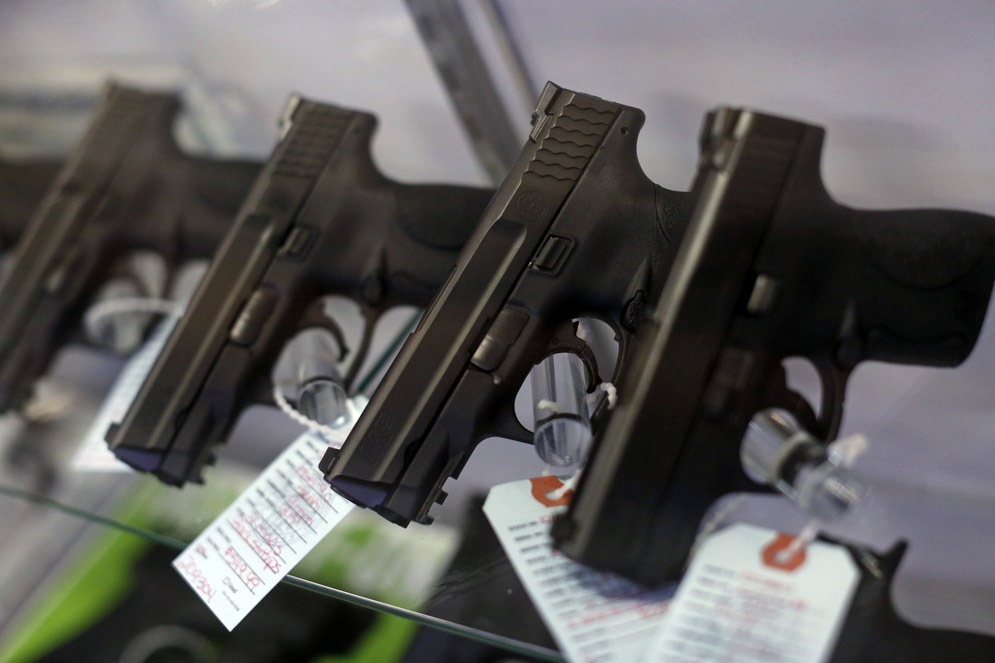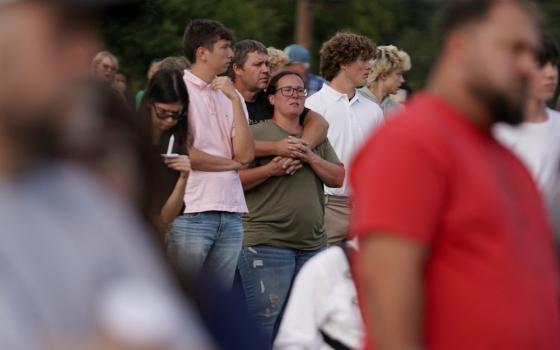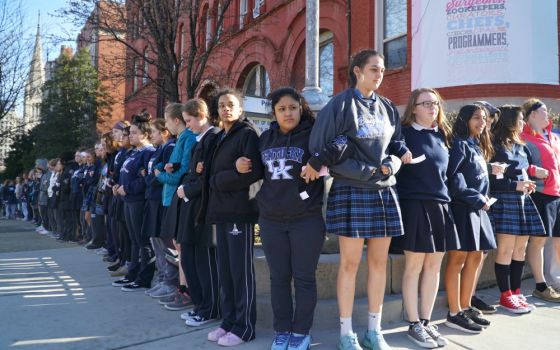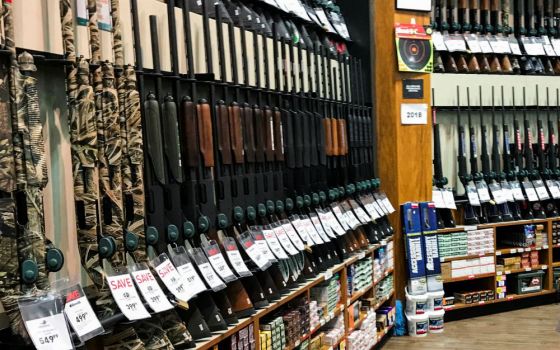
Handguns are seen for sale in a display case in 2014 at Metro Shooting Supplies in Bridgeton, Mo. (CNS/Jim Young, Reuters)
I'll tell you a story.
When I was in my first year of Boy Scouts, my tent partner and I had the foolish notion to keep our snacks in the tent overnight, despite any warnings from our superiors.
We went to bed that night, snacks in hand, and asleep with certain certainty that we knew enough about the world to know that it wasn't the snacks that were the problem; it was the simple fact that no scoutmaster had ever conceived of the possibility that two 12-year-olds happened to know more about the world than he did.
But sure enough and almost on cue, one or two raccoons could be heard purring outside in the darkness. My partner, a scout who prided himself with all of the answers, decided to throw his food into the thicket, the logic being that a toss of the food would keep the raccoons at bay and our campsite at peace.
This, of course, did not happen.
Within about five minutes, the one pair of glowing eyes in the lone flashlight we held to the forest line suddenly turned into eight. We threw rocks. We made noises. No matter what we tried, the only thing we could do was wait the night out in hopes that the coons would not make our first Boy Scout outing our last.
We are plagued, I hate to say, not by our crime-riddled society. We are plagued by a fabricated myth that somehow supplying our communities with guns is going to make crime go away. And any sociologist who studies the subject will argue that society, like crime, doesn't work that way. We need to talk about our values, and where we put our money.
We need to ask basic questions of our leaders, like why on one hand we want our children to grow up without the need to use guns to solve problems, while we lead the industrialized world in gun sales and gun-related deaths. We need to ask why we expect our children to grow up with the guidance of a strong moral compass and parents at the helm, when at the same time we stand at 39th among nations in childcare spending. And we need to ask our president and his allies in Congress why they keep saying that every new massacre plastering our momentary social feeds is a mental health issue, when at the same time they slash federal spending on mental health.
If we defined our family values by how we spend our money, then we are not sending the message I think we would like to espouse. It isn't about protecting our children. If that were true, we would have stopped the sale of military-style weapons — such as the AR-15 — long ago, maybe after Columbine or Las Vegas or any number of other tack marks on the frighteningly crowded corkboard of U.S. massacres.
Meanwhile the pile of victims fallen to our myth that guns equal safety is growing. That pile includes the 20 children in Sandy Hook, the 49 people at the Pulse nightclub, the 58 people in Las Vegas, and now the 17 students and staff at Marjory Stoneman Douglas High, to name only a few.
Throwing weapons at the threat of violence does not solve the threat of violence; it only makes our communities more violent.
We've tried the "more guns equals more safety" approach. We've tried it for well over 30 years. It isn't working. We're only supplying our communities — good and bad — with more weapons. And now, according to the latest sound bites out of the Trump administration, the solution isn't just more guns; they want to weaponize our schools.
There is no data on the planet that supports any notion that more guns on the streets of our nation are helping defend us from evil. None. They're just killing more of our people.
Advertisement
We need to find other ways of preventing these tragedies. Handing guns to our teachers and training them as paramilitary is not the answer, any more than throwing more food out of the tent is going to make the problems of a stubborn 12-year-old disappear.
The causes of violence start in the heart, said Seattle's retired Archbishop Raymond Hunthausen, and that is where they must end. And in a society that has a tendency to put its head in the sand (or hand on the trigger) before it ever attempts to reach into its soul, perhaps a change of heart is what we need to arm ourselves with, more than another gun in the hands of our children.
[Mario Penalver teaches at Harbor Ridge Middle School in Gig Harbor, Washington. He was the 2017 Teacher of the Year at Truman Middle School in Tacoma, Washington.]






